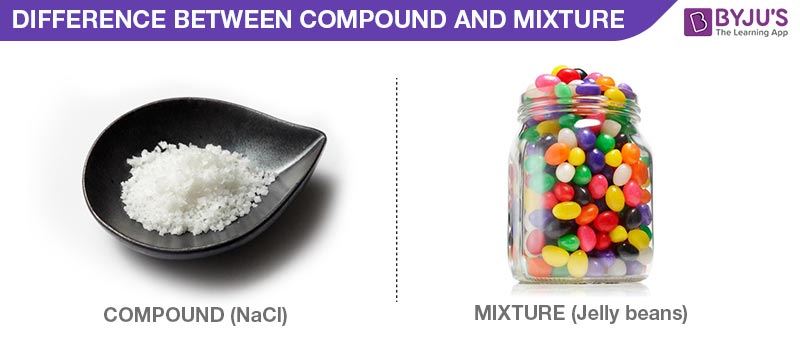
The key differences between compounds and mixtures have been provided in a simple tabular format in this article. It is important to know what compounds and mixtures are before going to their differences. To get a detailed idea about mixtures and compounds, visit the following links:

The differences between mixtures and compounds are tabulated below.
Difference Between Compound and Mixture
| Sl. No. | Differentiating Property | Compound | Mixture |
| 1 | Definition | Compounds are substances which can be formed by chemically combining two or more elements. | Mixtures are substances that are formed by physically mixing two or more substances. |
| 2 | Types | Compounds can be of three types, which are: covalent compounds, metallic compounds and ionic compounds.
Note: Compounds can be classified as organic compounds or inorganic compounds depending on the presence of carbon in the molecular structure. |
Mixtures are mainly of two types i.e. homogenous mixtures and heterogeneous mixtures. |
| 3 | Substance Category | Compounds fall under pure substances. | Mixtures can be categorized as impure substances. |
| 4 | Composition Details | The chemical composition of compounds is always fixed. | A mixture can have a variable composition of the substances forming it. |
| 5 | Nature | Compounds are always homogeneous in nature | Mixtures can either be homogeneous or heterogeneous in nature. |
| 6 | Separation of Constituents | The constituents of a compound can only be separated by either chemical or electrochemical methods (like extraction). | Mixtures can be separated into their constituents via physical separation methods such as filtration. Thus, the separation of mixtures is relatively easier than the separation of chemical compounds. |
| 7 | Properties | The properties of compounds are unique to themselves and need not necessarily reflect the properties of the constituent elements. | The constituents of a mixture do not lose their properties and so, the properties of a mixture are generally the sum of the properties of its constituents. |
| 8 | New Substance | A new substance is formed after the constituents are chemically combined. So, a compound has different properties from its constituents. | No new substances are formed in mixtures and their properties are dependent on the properties of their respective constituents. |
| 9 | Melting and Boiling Points | The melting and boiling points of a compound are always defined. | The melting and boiling points of a mixture are not defined. |
| 10 | Example | Water, salt, baking soda, etc. | Oil and water, sand and water, smog (smoke + fog), etc. |
These were the main mixtures and compounds differences that are crucial for not only examinations but also for competitive exams. Students are suggested to check more examples of compound and mixture and should know their detailed properties.
To learn more about compounds and mixtures, check the articles given below. These articles will help to understand the types of mixtures and compounds, their classification and other relevant details in a better way.
Frequently Asked Questions – FAQs
What does compound and mixture have in common?
Both compounds and mixtures are combined in any proportion or ratio. Compounds and mixtures are both made up of two or more substances/elements. Physical and chemical properties are shared by compounds and mixtures. A mixture’s or compound’s constituents or components can be easily separated.
Can mixtures be separated?
Methods that use differences in physical properties to separate the components of a mixture, such as evaporation, distillation, filtration, and chromatography, can be used to physically separate the components of a mixture.
Why are mixtures and compounds important?
Mixtures and compounds are important elemental combinations. They are required for both the chemical processes that support living things and those that occur on a daily basis in nonliving objects.
What is difference between compounds and mixture?
Compounds are substances formed by the chemical combination of two or more elements. Mixtures are substances formed by physically mixing two or more substances together..
Also Check:
| Pure Substances and Mixtures | Difference Between Organic and Inorganic Compounds |
| Heterogenous And Homogenous Mixtures | Separation Of Mixtures |
Keep visiting BYJU’S for more such physics lessons on different topics.

please send defination of
compound and mixture
Definition of compound
Compound are substances which can be formed by chemically combining two or more elements.
Definition of mixture
Mixtures are substances that are formed by physically mixing two or more substances.
Click here to learn more about compound and mixture
Can I know about properties of suspension
A suspension is a heterogeneous mixture. The size of solute particles in a suspension is quite large. It is larger than 100mm in diameter.
Click here to learn more about Suspension.
Awesome app